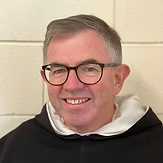Twenty-Third Sunday in Ordinary Time, Year C (2025) - Fr Anthony Walsh, OP
- Dominican Friars

- Sep 6, 2025
- 4 min read
This Sunday, Pope Leo XIV will canonise Bl. Pier Giorgio Frassati as a saint. There is no doubt that this young man is an inspiration for us all, but perhaps above all for young men today. Pier Giorgio will be raised to the altars as a saint—not because he was perfect, but because he lived this Gospel: he gave away what the world holds tightly, and found joy in Christ.
One of my favourite accounts of Pier Giorgio’s life was when he was a small child. When Blessed Pier Giorgio Frassati was just a small boy, he answered a knock at the great door of his family’s home. Standing there was a poor mother, holding her little child. The child had no shoes. Pier Giorgio looked at him for only a moment—then quietly slipped off his own shoes, gave them to the boy, and closed the door gently before anyone in his family could stop him.

It was a child’s gesture, simple and immediate. But it cost him something. His comfort, his parents’ approval, even the warmth of his own feet. And yet—he chose to give.
That small act holds the key to today’s Gospel. Jesus tells the crowds: ‘If anyone comes to me and does not hate father and mother … even life itself, he cannot be my disciple.’ The words jar us, they make us uncomfortable. But they point to this same truth: that to follow Him, something must be given up. Sometimes it is shoes, sometimes it is reputation, sometimes it is even family expectations. Always, it costs. Always, it frees.
We want the Gospel to comfort us. And it does. But sometimes it first has to unsettle us. Jesus doesn’t want half-followers, people who admire Him from the sidelines but never risk anything for Him. He wants disciples who know that to walk with Him means losing something. Maybe reputation. Maybe comfort. Maybe security. Maybe even family approval.
Now, at this point, we might be afraid. We hear Jesus speak of losing family, possessions, even life, and we think: ‘That’s too much. I can’t do that.’ And we’re right—we can’t, not by ourselves. The demand feels crushing, unless we see what Jesus is really inviting us into.
Here is the paradox: what we cling to, we lose. What we surrender, we find again—purified, transformed, given back a hundredfold. Jesus is not asking us to despise our families, but to love them rightly, through Him. He is not asking us to throw away life, but to discover real life in Him. He is not asking us to renounce possessions for the sake of emptiness, but so that our hands are free to receive what is eternal.
Pier Giorgio lost his shoes that day—but he found joy. He lost his parents’ approval many times—but he found Christ in the poor, and through Christ, the deepest happiness. People called him ‘the man of the eight beatitudes’ because he discovered the joy that comes only from giving everything to Jesus.
So this Gospel is not meant to crush us. It’s meant to free us. It’s meant to show us that our possessions, our comforts, even our reputations are too small to be the foundation of our lives. Only Christ is large enough. Only Christ is strong enough. And when we let go, we discover the strange joy of walking with Him without fear.
So the question this Gospel puts to us is simple: what am I clinging to that keeps me from being free in Christ? What are my shoes—the little comforts or securities I hold on to—that He is inviting me to give away?
But this Gospel is not only about material things. It reaches deeper—into our very relationship with God.
Too often, we want to box God in: we want Him to fit within our comforts, our habits, our ideas. But God is always more. The saints tell us that He is found not by clinging to what we know, but by letting go of it—by walking into the cloud, the darkness, the unknowing. That is the apophatic way: we discover God not by defining Him, but by surrendering to Him.
That’s why Jesus tells us to renounce, to abnegate. It’s not that possessions or family or life itself are bad—they are gifts! But they are too small to contain God. To discover Him, we have to let go. To find Him, we have to walk the path of abnegation. To love Him, we must open our hands—even when they are empty.
And when we dare to do that, we find, like Pier Giorgio, that God fills the emptiness with something greater than we could have imagined: His own life, His own joy, His own freedom.
Today, here at this altar, we do what Jesus asks. We let go of possessions, we let go of our definitions, and we open empty hands. And into those empty hands He places Himself—His own life, His own joy, His own freedom.

Fr Anthony Walsh, OP is the Master of Novices, assigned to St Laurence's Priory, North Adelaide, South Australia.




Comments